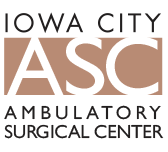icasc advantage blog
What to Expect from Your Cataracts Surgery Recovery
Posted by iowacityasc on Aug 23, 2023 10:13:45 AM
According to some estimates, there are over 3.7 million cataract surgery procedures in the United States every year. This makes cataract surgery one of the most common surgical procedures you might undergo. When you have cataract surgery, the cloudy and obstructed lens behind your eye is removed via a tiny incision. This lens is then replaced with a new, synthetic version, improving the clarity and vibrancy of your vision.
Topics: Cataracts
Everything You Need To Know About Cataracts And Cataract Surgery At Iowa City ASC
Posted by iowacityasc on Jul 10, 2019 2:56:57 PM
Have you recently been diagnosed with cataracts? If you have, you probably have many questions, especially about what cataracts are and how you can have yours treated. Being diagnosed with any medical condition can be overwhelming, and it isn’t uncommon for patients to feel a bit worried when they’re diagnosed with cataracts. At Iowa City ASC, though, we want to help patients feel relaxed, and that starts with a better understanding of whatever health conditions they are dealing with.
Topics: Cataracts
I Was Diagnosed With Cataracts. Now What
Posted by iowacityasc on Jan 17, 2017 4:22:17 PM
After your ophthalmologist has performed tests to confirm that you have cataracts, fear may set in. Being told that you have cataracts and that eventually you will need eye surgery to save your eyesight can be very scary news. It’s only natural to be afraid that there may a strong possibility you will go blind if you do not have the surgery. Then of course, there is the worry you might then have about having surgery on your eyes.
Topics: Cataracts
What Happens During Cataract Surgery?
Posted by iowacityasc on Jan 17, 2017 4:16:34 PM
Removing a cataract involves separating it from the lens capsule. The affected lens will be replaced with an intraocular lens implant (IOL). Sometimes it’s not possible to replace the lens. When this happens, your eye doctor will prescribe glasses or contact lenses that will compensate for not having a lens in your eye.
Topics: Cataracts
Preventing Cataracts
Posted by iowacityasc on Jan 17, 2017 3:52:56 PM
There is no scientific proof that cataracts can be prevented. Most types of cataracts are usually accepted as a normal part of aging. However, doctors advise that there might be ways to reduce your risk of developing or slow their progression.
Topics: Cataracts
How To Keep Cataracts From Getting Worse
Posted by iowacityasc on Jan 17, 2017 3:48:12 PM
It can be upsetting to find out that you have cataracts. You might even be afraid that you will suddenly go blind. However, that is not how cataracts work. With cataracts, your eyesight will progressively become worse, depending on which stage this condition has been found. In many cases, surgery will not be indicated immediately after being diagnosed with this condition.
Topics: Cataracts
How Cataracts Affects Your Vision
Posted by iowacityasc on Jan 13, 2017 1:35:03 PM
You, like a majority of older adults might be affected by age-related cataracts at some point during your life. Because the symptoms of cataracts are not immediately noticeable, it is important to have your eyes examined as recommended by your eye doctor to catch them at an earlier stage. Once you have been diagnosed with cataracts, you may have many questions, but the most important one you might want to ask your doctor is how cataracts will affect my vision.
Topics: Cataracts
Cataracts – The Basics
Posted by iowacityasc on Dec 01, 2016 11:46:44 AM
It is common for adults over 60 to begin to develop cataracts that will affect their vision. Not all cataracts need to be treated, but when they interfere too much with your vision, you may need surgery to restore your eyesight back to normal.
Topics: Cataracts
Facts About Cataracts
Posted by iowacityasc on Dec 01, 2016 10:45:53 AM
Facts About Cataracts
Over half of the adults in the United States will have contracted cataracts by the time they’re 80 years-old. This condition usually appears in adults over 40, and it is related to the natural aging process of the body. There are, however, additional factors that can increase your risk of developing cataracts, including certain medications, your lifestyle, and the environment where you live.
Topics: Cataracts
Common Symptoms of Cataracts
Posted by iowacityasc on Nov 30, 2016 4:27:56 PM
It is important to make an appointment immediately if you notice any sudden changes to your vision. However, with cataracts you might not notice any changes in your vision right away.
Most cataracts develop slowly, and it might take a couple of years before they interfere with your vision.
Early detection through yearly eye exams, especially if you are over 60 or take medications that make you more susceptible, are crucial to protecting your eyes from cataracts.
Topics: Cataracts







